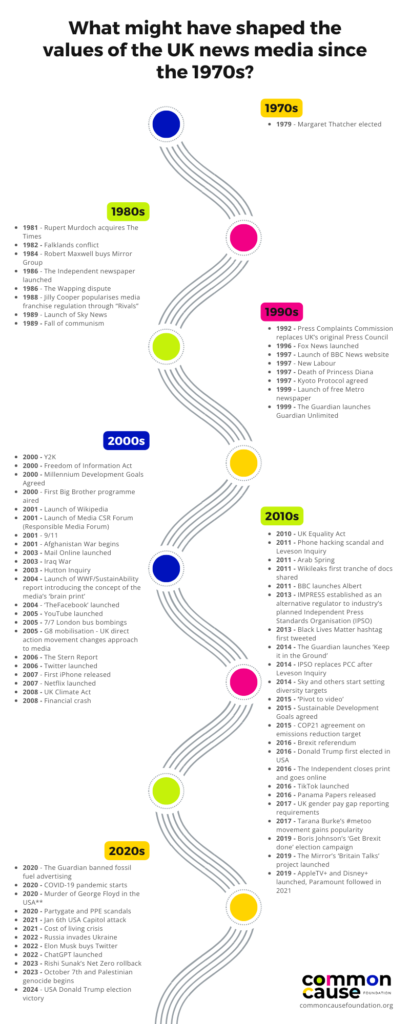Are we more likely to value a CEO’s quarterly profits or a community’s collective resilience? Do we celebrate individual wealth and prestige or collective wellbeing? How does the mainstream news media help shape which of these things society sees as important? Last month, media professionals gathered at the historic St Ethelburga’s in London to grapple with such questions and explore the complex relationship between media and cultural values as part of the Values in the Media project.
At the heart of the discussion lay a critical examination of how the UK news media shapes societal priorities – from financial success to community wellbeing and environmental concerns. Values in the Media project lead Elsie Roderiques opened the afternoon with a compelling challenge: while the vast majority of journalists strive to report facts objectively, we must acknowledge that journalism is, inescapably, value-laden.
Elsie suggested that journalists have traditionally seen themselves as neutral conduits of information, prioritising factual reporting and professional detachment. Yet at every stage of the news production process, values are present and influential.
The opening presentation demonstrated that the news media isn’t just reporting the world—it’s actively contributing to constructing our collective understanding of what matters. Each headline, image, and narrative thread, each decision made at the executive level, by editors, in the newsroom—these aren’t just reporting events, but subtly (and sometimes not so subtly) sculpting our cultural values.
The opening presentation challenged the audience to consider a number of questions: If values in the media are inevitable, and there is much evidence to suggest that they are, how do we ensure that there is, firstly, more conversation and transparency about these values? What does it look like for the media to be more responsible and accountable for these values? Which values might we choose to transparently and intentionally foreground in a media landscape that is fit for these times and the many social, political, economic and environmental challenges we find ourselves navigating.
Following the opening talk, the brilliant panel of speakers; including CNN’s Eliza Anyangwe, ITV’s Jeremy Mathieu, Byline Times’ Hardeep Matharu, and investigative journalist Nafeez Ahmed; shared their own personal insights and reflections from their diverse experiences of life in and around UK newsrooms within the context of an industry facing significant pressures. There was rich discussion between panel members and the audience, closing with the recognition that we can have the same values, but that these can mean different things to us and a desire to understand, in terms of the news media, how a better understanding and consciousness around values might help ‘different camps’ might be reconciled across seemingly ever widening political and social divides.
Later in the afternoon, two parallel workshops engaged attendees to either think about their own personal values and how these may, or may not be, reflected in the work that they do, or to explore a timeline of events throughout history that may have shaped the values of the mainstream media sector itself that we see today. You can see the outputs of the timeline session below.


The world is changing rapidly, and the challenges we face are many. In the words of our panel guest Eliza; people will always need trustworthy sources of information to understand and navigate the world. What might a ‘news’ landscape look like that rises to meet and support us in facing these challenges? In this period of transition, events like this provide crucial spaces for industry professionals to step back and consider their role and responsibility in shaping our society. The discussions highlighted that while the challenges are significant, there are also opportunities for media organisations to help facilitate life-giving and meaningful cultural change.
Five takeaways from the Values in the Media conference
- Journalism can’t be values-free (even when we try)
Think journalism is just about the facts? Think again. From choosing which stories make the front page to picking the perfect headline, every decision in journalism elevates certain values. It’s time we talked about it.
- The news isn’t just reporting the world – it’s shaping it
The choices made by media professionals do more than inform – they help create society’s picture of what matters. When a story spotlights a CEO’s bonus over a community project, it’s sending subtle messages about what we should value.
- It’s time for a more open conversation about values
The elephant in the newsroom? It’s values. We need more honest conversations about the values driving our decisions and better ways to hold ourselves accountable. Understanding shared values but different perspectives could even help bridge those tricky political divides we’re all wrestling with.
- Change is inevitable (and it’s not all bad)
Yes, the media industry faces huge challenges – from funding pressures to trust issues. But here’s the thing: people will always need reliable, trustworthy information. There is an opportunity for this shake up to reshape the media for the better.
- Mind the gap: personal vs newsroom values
Many journalists start their careers full of ideals, only to find newsroom realities more complicated. Understanding this tension – and the history behind it – could help us build more ethical newsrooms that support journalists and audiences to flourish.
These conversations aren’t just about better journalism – they’re about building a media landscape that helps society thrive. As one participant put it, understanding values isn’t just about better reporting – it’s about creating a better future.
Want to join the conversation? Sign up to our free two-hour online follow up workshop: Values in the Media: working with values in practice session taking place on 23rd January here.
If you’d like to receive updates about the Values in the Media project, including future events and workshops, please sign up to receive emails by emailing: eroderiques@commoncausefoundation.org.